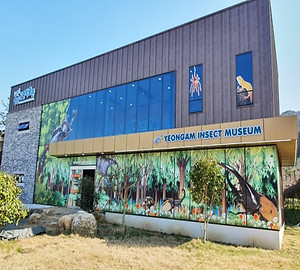
MUAN
Muan is a county in South Jeolla Province (Jeollanam-do), South Korea. In 2005, Muan County became the capital of Jeollanam-do following the transfer of the provincial office from its previous location, Gwangju to the village of Namak in Muan. Muan International Airport was opened here, and will eventually replace the airports in Gwangju and Mokpo.

MUAN HOESAN WHITE LOTUS POND
Muan Hoesan White Lotus Pond is the largest habitat of white lotus in Asia, covering an area of approximately 330,000 square meters in Bogyong-ri, Muan-gun in Jeollanam-do. This pond was originally a reservoir made during the Japanese colonial period for irrigation, but was abandoned with the development of the Yeongsangang River system. The reservoir was recreated and expanded into today's lotus habitat thanks to the effort of Jeong Su-dong, who planted twelve lotus roots along the shoreline and took care of them dearly after dreaming of twelve white cranes landing upon the reservoir. The white lotus flowers in this pond blossom and fall from July until September. A lotus festival is held in August, when the flowers are at their peak.
Address: 333, Baengnyeon-ro, Muan-gun, Jeollanam-do
TEL: +82-61-283-1325
Website: tour.muan.go.kr

UGLY ART MUSEUM
The Ugly Art Museum is a small art museum that opened in October 2016 and is filled with the works of sculptor Kim Pan-sam. It is a space where you can upgrade your life by understanding the artist's work and outlook on life. It consists of an art museum, a hill, an experience center, and a children's forest. The sculptor’s question, ‘Isn’t a work of art considered beautiful not art?’ led to the creation of the Ugly Art Museum. The message of the Ugly Art Museum emphasizes ‘the inner beauty of looking into the stories of works rather than their appearance and finding the best beauty they contain.’ This is why the Ugly Art Museum exists, a place that is pretty even if it is not made well, is fun even with small movements, and has the pleasure of being ugly and crude.
Address: 125 Sangsabawi-gil, Ilo-eup, Muan-gun, Jeollanam-do
TEL: +82-10-5323-8325
Website: http://www.monnani.art/

MUAN ECOLOGICAL TIDAL FLAT LAND
Muan Ecological Tidal Flat Land in Muan, Jeollanam-do was established in an effort to raise awareness of the ecology and importance of natural wetlands. It is the nation’s largest educational center for natural ecology. In addition to the main research center, visitors can enjoy a variety of exhibitions and experiences, ranging from bonzai plants to structures made with red clay bricks, and convenience facilities such as restaurants and cafes.
Address: 36, Mansong-ro, Muan-gun, Jeollanam-do
TEL: +82-61-450-5634
Website: getbol.muan.go.kr

YEONGAM WANGIN CULTURE FESTIVAL
Yeongam Wangin Culture Festival is held to commemorate the achievement of Korea’s Dr. Wangin, who traveled to Japan over 1,600 years ago to spread Korean knowledge, culture, and arts. Visitors can enjoy various events during the festival period.
Address: 440, Wangin-ro, Yeongam-gun, Jeollanam-do
TEL: +82-61-470-2346
Website: www.왕인문화축제.com

YEONGAM INSECT MUSEUM
Yeongam Insect Museum is located in Yeongam Gichan Land, Hoemun-ri, Yeongam-eup, Yeongam-gun, Jeollanam-do. This is a museum where children can see and experience insects and reptiles. It is a happy playground for children where education and play come together through friendly explanations and various experiences. The museum displays over 700 various specimens of insects from around the world. With explanations from the commentator, we can have fun learning about insects we didn't know about. The lawn in front of the museum has tools for children to play with, such as tuho, ring toss, and catch balls, making it suitable for families.
Address: 41 Gichanland-ro, Yeongam-eup, Yeongam-gun, Jeollanam-do
TEL: +82-507-1371-4300

WOLCHULSAN NATIONAL PARK CHEONHWANGSA TEMPLE AREA
Wolchulsan Mountain is a mountain-type national park at the southernmost tip of the Korean peninsula that, befitting its name of the mountain where the moon rises, combines beautiful natural scenery, cultural resources, and the local atmosphere of the South. Although it is a small area (56.220㎢) with many rocks and steep valleys, it is home to about 700 species of plants and 800 species of animals. Its conservation importance can be said to be very great due to its unique ecology that has adapted to the rocky terrain over a long period of time and its location where subtropical and temperate forests coexist. If you go up the hiking trail, you will find Cheonhwangsa Temple's outdoor sculpture park and campsite. The cool sound of water in Wolchulsan Cheonhwang Valley provides great visual and auditory comfort to hikers descending the mountain.
Address: 306 Dogapsa-ro, Gunseo-myeon, Yeongam-gun, Jeollanam-do
TEL: +82-61-473-5210
Website: https://www.knps.or.kr/